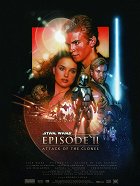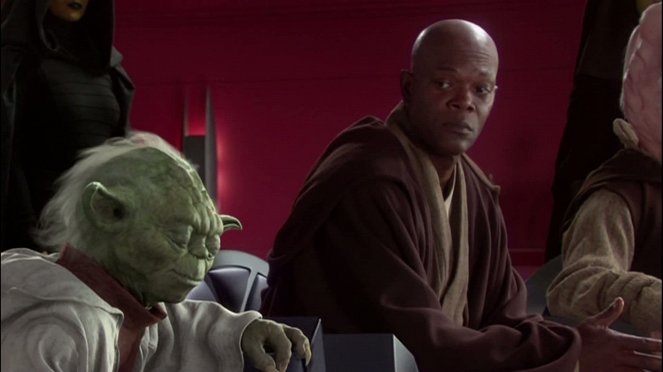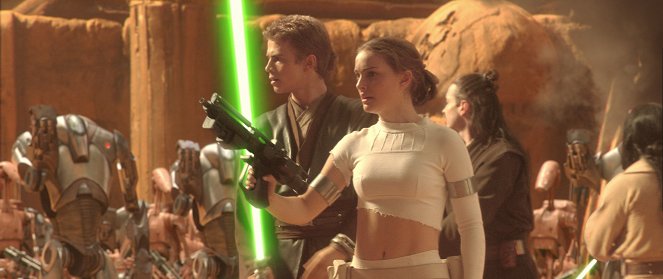Directed by:
George LucasCinematography:
David TattersallComposer:
John WilliamsCast:
Ewan McGregor, Natalie Portman, Hayden Christensen, Christopher Lee, Samuel L. Jackson, Frank Oz, Ian McDiarmid, Pernilla August, Temuera Morrison (more)VOD (4)
Plots(1)
Set ten years after the events of "Star Wars: Episode I - The Phantom Menace", not only has the galaxy undergone significant change, but so have our familiar heroes Obi-Wan Kenobi, Padme Amidala, and Anakin Skywalker, as they are thrown together again for the first time since the Trade Federation invasion of Naboo. Anakin has grown into the accomplished Jedi apprentice of Obi-Wan, who himself has transitioned from student to teacher. The two Jedi are assigned to protect Padme whose life is threatened by a faction of political separatists. As relationships form and powerful forces collide, these heroes face choices that will impact not only their own fates, but the destiny of the Republic. (official distributor synopsis)
(more)Videos (1)
Reviews (12)
The episode for which I had an extreme weakness at one time is starting to age a bit. Obi-Wan's antics across half the galaxy still work, and when the lightsabers turn on, shivers run down my spine, but the romantic storyline is perhaps too simple. Natalie Portman's etherealness, however, makes me forget the fact that Hayden sometimes falls short of playing such a complex character as Anakin Skywalker despite his earnest efforts.
()
The love scene with the couple by the waterfalls looks like a Nivea commercial. During the battle in the arena, the Jedi look so bored with their lightsabers that I keep waiting for them to roll a joint. The final battle is a massive mess. Add to that directorial shortcomings such as the final chase, in which Padmé falls out of a flying machine, drops from a great height to the ground and, as if in a last ditch effort, shakes her legs like a beetle, gets back on her feet like nothing happened and starts giving orders. There is no point in going on about other lapses, there are plenty of them. Lucas wanted to pay homage to everyone: Beverly Hills 90210, Gladiator, Chaplin's Modern Times, Blade Runner – it's all here. Unfortunately. But this is still Star Wars, and as the episodes roll in, this new coat of the magic that I love so much from the original trilogy takes on a new look.
()
Before the film, I seriously considered "withdrawing from the Star Wars race," but I took my chances. And look, it paid off! The children’s nonsense has disappeared, the power has returned, fate has returned, darkness has returned. I particularly liked Hayden Christensen, inside of whom two irreconcilable opposites, the dark and light side of power, are at war. His balancing act is often escalated by John Williams' great music. The atmosphere is more reminiscent of the Jedi Knight computer series (it's darker, more fatal, less fairytale compared to the original films), which is not at all a bad thing. Ewan McGregor is also good, who, along with a restless and emotionally charged "Padavan", makes the excellent second film. The love plot is somewhat forced and overly stylized, but luckily, it quickly drops off to give way to the action. Yes, the second film moves from the fairytale of the first films to a more serious tone, which may not be endearing to those who love the originals, but for us younger people who have already experienced the birth of computer processing of SW (starting with Dark Forces), this world is close to us after all. Still, I think Attack of the Clones is the rightful successor to Episodes IV-VI...
()
Whereas Star Wars: Episode I “only” lacked the heart of the original trilogy, Episode II is just a dramaturgically lame comic-book popcorn flick. At the same time, however, it’s jam-packed with so many great characters, bombastic action, romance and plot twists that are important to the development of the Star Wars saga that it’s impossible to be bored for even a second. The visual effects are shoddy in some places, but the best of them are stunningly good. This is not the good old heartwarming Star Wars of before, but in the context of contemporary eye-candy popcorn entertainment, it’s great.
()
I have never really loved the new trilogy, but if I set aside the romance from this film, it's actually a pretty good bridge to the third and best film of the new trilogy. Visually, it's captivating, and especially the planet Kamino seems absolutely enchanting to me. It's probably because of the water, rain, and constant darkness. Obi-Wan is definitely the best character of the entire trilogy.
()



Ads